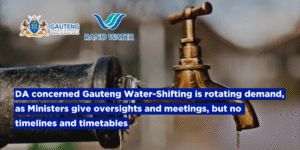Please find attached a soundbite by Ashor Sarupen MP.
National Treasury tabled the third-quarter government expenditure report to Parliament’s Appropriation Committee on 14 Feb 2024. This report confirms that multiple state-owned companies that have received bailouts in recent years remain in financial distress and are still bleeding money at an alarming rate. The full report is available here.
Eskom, which is receiving R254 billion in bailouts between 2023 and 2025, has recorded a loss of R7.5 billion up to the end of fiscal Q3 2023/24. Alarmingly, municipal debt to Eskom has grown by R16.9 billion over the same time frame from the preceding financial year and now stands at a whopping R75.4 billion. Eskom sales have also declined by 5.1% year on year, but primary energy costs have risen by 12.4 billion.
The Land Bank, which has been in default on its debt obligations since 2020 and has been subject to recapitalization from the state, as of 31 December 2023 recorded a net loss of R97 million (it had budgeted to achieve a profit of R99.4 million).
South African Airways was given a R10.5 billion bailout in 2020, and a further R1 billion in 2023. In the Q3 report, SAA reported a net loss of R761 million, against the budgeted profit of R92 million for the period under review. SAA has also missed its revenue targets by R900 million.
Transnet was unable to meet maturing debt obligations of R14-billion due by the end of the financial year, and the Finance Minister has given the entity a massive R4-7 billion debt guarantee.
Denel was given a R3,3 billion bailout in 2022, and has lost R463 million at the end of the quarter, against a budgeted loss of R339 million.
The alarming financial distress exhibited by multiple state-owned companies, as highlighted in the third-quarter government expenditure report, demonstrates that the bailout strategy of the ANC has failed. These ongoing bailouts now pose a threat to long term fiscal sustainability and the ability of the state to deliver services and deliver on infrastructure needs.
The DA’s long-standing opposition to these indiscriminate bailouts is based on the fact that these bailouts divert funds that should be used to supplement hard pressed services such as healthcare, education and policing.
The government needs to accept that SOEs are now in a death spiral, due to the long-term impacts of mismanagement and cadre deployment. The endless bailout strategy has failed. Should the state insist on continuing down this path, it will result in economic instability, reduced investor confidence, and hindered overall growth.




